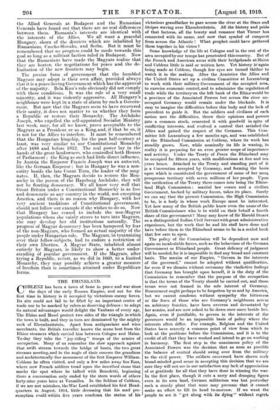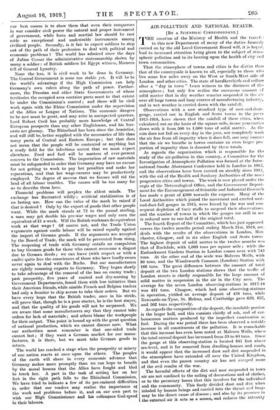THE RHINELAND.
COBLENZ has been a town of fame in peace and war since the days of the early Roman Empire, and not for the first time in history is it occupied by victorious enemy forces. Its site could not fail to be filled by an important centre of trade nor to be marked by rulers as deserving defence : to adapt its natural advantages would delight the Vaubans of every age, The Rhine and Mosel protect two sides of the triangle in which the town is built, and they in turn are dominated by the mighty rock of Ehrenbreitstein. Apart from antiquarians and wine merchants, the British traveller knows the scene best from the Rhine steamers which carried him between Cologne and Mainz. To-day they take the " joy-riding " troops of the armies of occupation. Many of us remember the slow approach against that swift stream towards the bridge of boats, the two great streams meeting, and in the angle of their courses the grandiose and architecturally fine monument of the first Emperor William. Coblenz he often visited, and only a few miles away lies Ems, where now French soldiers tread upon the inscribed stone that marks the spot where he talked with Benedetti, beginning there a conversation only ended by the stern words of others forty-nine years later at Versailles. In the Schloss of Coblenz, if we are not mistaken, the War Lord established his first Head- quarters in August, 1914, little dreaming thit his mad pre- sumption could within five years condemn the statue of his victorious grandfather to gaze across the river at the Stars and Stripes waving over Ehrenbreitstein. All the history and pride
of that fortress, all the beauty and romance that Turner has connected with its name, and now that symbol of conquest from across the Atlantic ! What prophet could have gathered them together in his vision ?
Some knowledge of the life at Cologne and in the rest of the area occupied by our troops has penetrated this country. But of the French and American areas with their bridgeheads at Mainz and Coblenz little is said or written here. Yet history is'again being made at Coblenz, though few eyes are turned thither to watch it in the making. After the Armistice the Allies and the United States set up a civilian Committee at Luxemburg to work with their military Government of the occupied area, to exercise economic control, and to administer the regulation of trade while the territory on the left bank of the Rhine would be a province of the Associated Powers but across the river un- occupied Germany would remain under the blockade. It is easy to imagine the difficulties before this body and the lack of precedent to guide it. But the soldiers and civilians of each nation met the difficulties, threw their opinions and powers into a common stock, cemented it with goodwill in spite of conflicting interests, and evolved a control that satisfied the Allies and gained the respect of the Germans. This Com- mittee left Luxemburg a few months ago, and was established as the Rhineland Commission at Coblenz, where its work has steadily grown. Now, while nominally its life is waning, in reality it is preparing for an even greater scope of importance and activity. Under the Treaty of Peace the Rhineland may be occupied for fifteen years, with modifications at five and ten years hence. Attached to the Treaty and standing part of it is a Convention accepted by Germany, and forming the basis upon which is constituted the government of some of her most prosperous territory with seven millions of her people. Upon the ratification of the Treaty there comes into being the Rhine- land High Commission : martial law ceases and a civilian Government, backed by military forces, takes its place. Surely we can say that the present Commission, the High Commission to be, is a body in whose work Europe must be interested. Yet how many of the British public know even the name of the British Commissioner who is to wield on their behalf a fourth share of this government ? Many may know of Sir Harold Stuart as a distinguished Indian Civil Servant with great administrative experience, but the work that he and his staff have done and have before them in the Rhineland seems to lie in a sealed book that few care to open.
The policy of the Commission will be dependent now and again on incalculable forces, such as the behaviour of the German Government or Rhineland people. Great delicacy of judgment will be needed, for it is impossible to find any broad and constant basis. The maxim of our Empire, " Govern in the interests of the governed," cannot be adopted without qualification, for even if we dismiss without ceremony the vindictive feelings that Germany has brought upon herself, it is the duty of the Commission to remember that the purpose of the occupation is that the terms of the Treaty should be carried out, and those terms were not framed in the sole interest of Germany. Resentment ought perhaps to be forgotten by us and by America, but we cannot condemn without sympathy the bitterness or the fears of those who are Germany's neighbours across an arbitrary frontier, have been overrun and devastated by her armies, and are now asked to lie down once more beside her. Again, even if justifiable, to govern in the interests of the governors would be an impossible basis of policy where the interests often differ. For example, Belgium and the United States have scarcely a common point of view from which to look at the problems before the Commission, and it is to the credit of all that they have worked and intend to go on working in harmony. The first step in the unanimous policy of the Associated Powers was the decision that as soon as possible the balance of control should swing over from the military to the civil power. The soldiers concerned have shown such broad-minded good sense in accepting this decision that we are sure they will not see in our satisfaction any lack of appreciation of or gratitude for all that they have done in winning the war. In the first place, though it cuts a sorry and drooping figure even in its own land, German militarism was but yesterday such a sturdy plant that none may presume that it cannot make an effort to lift its head to-morrow. If we want the people to see it " get along with its dying " without regret, cur best course is to show them that even their conquerors in war consider civil power the natural and proper instrument of government, while force and martial law should be cast aside as exceptional and undesirable instruments among civilized people. Secondly, is it fair to expect soldiers to step out of the path of their profession to deal with political and economic problems ? The world has admired since the days of Julius Caesar the administrative statesmanship shoswn by many a soldier : of British soldiers let Egypt witness, Morocco tell of General Lyautey.
None the less, it is civil work to be done in Germany. The Central Govprnment is none too stable yet. It will be to the world's advantage if the High Commission can help Germany's own rulers along the path of peace. Further- more, the Prussian and other State Governments of whose territories the occupied area contains parts must to that extent be under the Commission's control ; and there will be civil work again with the Rhine Commission under the supervision of the Allies or League of Nations. The economic dangers to be met must be great, and may arise in unexpected quarters. Lord Robert Cecil has probably more knowledge of Central European prospects than any other Englishman, and his fore- casts are gloomy. The Rhineland has been since the Armistice, and will still be, better supplied with the necessaries of life than many parts of Central and Eastern Europe ; but that does not mean that the people will be contented or anything but a ready field for the infectious unrest that we must expect elsewhere. Food and fuel will be matters of ever-present concern to the Commission. The importation of raw materials must be safeguarded in order that Germany may have no excuse for not getting to work to pay her penalties and make her reparations, and that her wage-earners may be productively employed. No degree of success that we foresee will rid the land of all labour troubles. The causes will be too many for us to describe them here.
Financial problems will perplex the ablest minds. The exchange has fluctuated wildly ; artificial stabilization is of no lasting use. How can the value of the mark be raised if that is desired ? Only by the export of goods that other people want. While the mark stands at 72 to the pound sterling, a man may get double his pre-war wages and only earn the equivalent of £1 a week. Will the British workman do equivalent work at that wage ? Of course not, and the Trade Union arguments against coolie labour will be raised equally against the import of German goods. If the arguments are accepted by the Board of Trade, the mark will be prevented from rising. The reopening of trade with Germany entails no compulsion to buy German goods for those who cannot overcome a disgust due to German deeds ; we can leave (with respect or with a smile) quite free the consciences of those who have loudly sworn never again to deal with the Boche. But our manufacturers are rightly resuming exports to Germany. They began slowly to take advantage of the removal of the ban on enemy trade ; past prosperity, five years of control and dry-nursing by Government Departments, found them with less initiative than their American friends, while nimble French and Belgian traders had only a frontier to skip across to take their orders. But we have every hope that the British trader, once in his stride, will prove that, though he is a poor starter, he is the best stayer, and that the quality of his goods will not be surpassed. We are aware that some manufacturers say that they cannot take orders for lack of materials ; and others blame the workpeople for their output. This point is bound up with the great question of national production, which we cannot discuss now. What our authorities must remember is that one-sided trade cannot last ; if they want a German market for our manu- factures, it is there, but we must take German goods in return.
The world has reached a stage when the prosperity or misery of one nation reacts at once upon the others. The peoples of the earth will share in every economic advance that Germany makes more promptly than we can hope to benefit by the moral lessons that the Allies have fought and bled to teach her. A part in the task of setting her on her feet in the right path falls to the Rhineland Commission, We have tried to indicate a few of its pre-eminent difficulties in order that our readers may realize the importance of the work and problems before it, and on our own part to wish our High Commissioner and his colleagues God-speed in their labours.



































 Previous page
Previous page